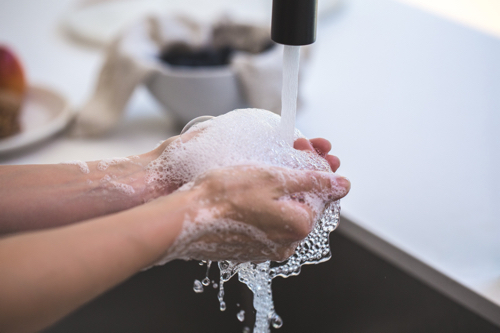
Coronavirus and Eating Disorders
Coronavirus and Eating Disorders:
Impacts and Action Steps
FREE WEBINAR – MONDAY, MARCH 16
Click the link below to watch recording:
https://www.drdorie.com/coronavirus-webinar/
Coronavirus news is pretty much anywhere you look. What about the coronavirus and eating disorders? As COVID-19 spreads across the United States and around the world, how are people with eating disorders being impacted? Are there specific steps that those in recovery from eating disorders can take, not only to reduce the risk of the coronavirus but also to prevent their eating disorders from worsening as a means of coping with anxiety, fear, powerlessness, loneliness, and other intense emotions? Can counselors, psychologists, social workers, dietitians, recovery coaches and other health professionals – as well as friends and family members – offer unique assistance?
Impacts of the Coronavirus on People with Eating Disorders:
As those of us involved in the treatment of eating disorders know, one of the causes of eating disorders is “trying to be in control when things feel out of control.” According to numerous news updates, the spread of COVID-19 is far from “under control.” Here are a few things that I am noticing in my clients, as well as what my supervisees and mentees are reporting in their client populations. It is my hope that this information can give you insights into what interventions can be implemented:
- Anorexia Nervosa and Coronavirus: Extreme anxiety due to disruptions in eating disorder rituals and routines; avoidance of gyms and increased exercise outdoors, even in poor weather; worsening restriction through the justification that grocery shopping in crowds is unsafe; worsening isolation due to fears of coronavirus community spread; worsening of co-morbid issues such as Mood Disorders, Personality Disorders, Obsessive-Compulsive Disorder, Substance Use Disorder; much higher risk of severe symptoms of COVID-19 if the coronavirus is contracted, due to underlying health issues related to Anorexia Nervosa.
- Bulimia Nervosa and Coronavirus: Extreme anxiety due to disruptions in eating disorder rituals and routines; avoidance of gyms and increased exercise outdoors, even in poor weather; worsening restriction through the justification that grocery shopping in crowds is unsafe; hoarding of binge foods which can worsen binge/purge behaviors; worsening isolation due to fears of coronavirus community spread; worsening of co-morbid issues such as Mood Disorders, Personality Disorders, Obsessive-Compulsive Disorder, Substance Use Disorder; higher risk of severe symptoms of COVID-19 if the coronavirus is contracted, due to underlying health issues related to Bulimia Nervosa.
- Binge Eating Disorder and Coronavirus: Extreme anxiety due to disruptions in eating disorder rituals and routines; hoarding of binge foods which can worsen binge/purge behaviors; worsening isolation due to fears of coronavirus community spread; worsening of co-morbid issues such as Mood Disorders, Personality Disorders, Obsessive-Compulsive Disorder, Substance Use Disorder; risk of severe symptoms of COVID-19 if the coronavirus is contracted, due to underlying health issues related to Binge Eating Disorder.
Action Steps that People with Eating Disorders Can Take:
Of course, you’ll want to follow the guidelines to reduce the spread of the coronavirus, as offered by your local and state government, as well as the National Center for Disease Control and International World Health Organization. As a Certified Eating Disorder Specialist with more than 25 years of clinical experience, here are a few strategies that I can suggest for those with eating disorders to reduce the risk of contracting the coronavirus while also practicing Self-Care as an essential aspect of eating disorder recovery:
- Name your emotions while realizing YOU are NOT your emotions: For example, “I feel afraid,” rather than personalizing the emotions, such as, “I AM terrified!” Separate the feeling (fear) from your Self. YOU are not fear, terror, etc. You may FEEL afraid, terrified, etc. – but like waves in the ocean, these feelings can come and go, when you avoid attaching to them and let them go. In addition, you can FEEL more than one emotion at once – try to name some supportive emotions you may also feel, such as, “I feel hopeful, creative, loving.” Acknowledge that some emotions FEEL more comfortable than others. Become aware of emotions which are based on the past or the future, rather than the here-and-now. These are some core practices of mindfulness-based therapies, such as Dialectical Behavior Therapy (DBT) and Acceptance and Commitment Therapy (ACT). Realize that YOU are NOT your emotions. As Pema Chödrön is quoted as saying, “You are the sky. Everything else – it’s just the weather.”
- Be aware of attaching “facts” versus “fiction” to your emotions: For example, “I feel afraid because the coronavirus is killing millions of people (fiction), and eventually we’re all going to get it (fiction), and there is nothing I can do to avoid getting it (fiction), and everybody is going to die (fiction)…oh my gosh, I’m terrified!” You can see how “fiction” can spiral into catastrophic thinking, and extreme emotions. One of the basic principles of Cognitive Behavioral Therapy (CBT) is that events result in thoughts that trigger emotions. If we have “irrational thoughts” about events, this can cause unhelpful and intensely painful emotions. Pausing to notice thoughts, and focusing only on facts (without added fictional stories), is essential. “The coronavirus has killed thousands of people worldwide.” Fact. “I feel worried.” Emotion based on fact. “There are steps I can take to stay safe.” Fact. “I feel relieved.” Emotion based on fact. “My eating disorder won’t make the coronavirus go away.” Fact. “My eating disorder can worsen my risk of getting the coronavirus.” Fact. “I intend to stay focused on recovery and Self-Care.” Fact. “I feel empowered.” Emotion based on fact.
- Stay connected with your eating disorder recovery community: Many support groups are now being offered online, through chat rooms and video conferencing. Check with local and national eating disorder organizations for more information. I offer “virtual therapy sessions” through HIPAA-compliant platforms, so you don’t need to leave your home in order to have a session with me, here in my state of licensure in Colorado. Most therapists, dietitians, and even medical doctors are able to offer tele-health services in your state. Health and Life Coaches have been conducting sessions-by-phone for years, and there are no boundaries created by state lines (coaches can provide services anywhere in the world). Through my business, the EDIT™ Training Institute, people have become certified as Eating Disorder Intuitive Therapy (EDIT)™ – Eating Disorder Treatment Clinicians and Recovery Coaches. Find an EDIT™ Certified Clinician or Coach Here
Action Steps to Help People with Eating Disorders:
Someone you love may be struggling with an eating disorder, and you may be noticing that their behaviors are becoming worse, possibly as a way of coping with the coronavirus outbreak. Or, you may be a mental health clinician or health coach who is aware that underlying health issues (such as eating disorders) can worsen the severity of the coronavirus. Here’s how you can help, even if you don’t have training to provide support, recovery coaching, or therapy to those with eating disorders:
- Friends & Family: Be a role model for someone in recovery. Demonstrate coronavirus precautions such as hand washing, while illustrating how to avoid obsessive/compulsive behaviors. Offer to grocery shop together, while showing how to appropriately use hand sanitizers and exhibit social distancing. In nice weather, go to a park and take a walk together, or practice gentle movement such as yoga, using online instructional sources. Offer to cook meals and eat together. Keep your own thoughts and emotions in check (refer to the points in the section above). Be compassionate if the person you love does use their eating disorder behaviors as a means of coping. As them if there is anything else that you can do to help. Download FREE EDIT™ Resources or become an EDIT™ Certified Peer Support Provider to learn additional skills
- Clinicians & Coaches: People with eating disorders and other mental health issues really need your help right now! Many of you may be working from home for a period of time. You can use HIPAA-compliant audio and video conferencing to have sessions with your clients while they remain in their own homes. Here are a few resources to consider: doxy.me, wecounsel.com, zoom.us. Since coaches are not bound by HIPAA regulations, you can use Skype, FaceTime, or a standard phone call. Be aware that clients with a previous history of eating disorders may have a recurrence as a means of coping. Or, clients with Substance Use Disorders may not be able to obtain alcohol or other drugs, and they can develop eating disorders as a replacement. Are you equipped to diagnose and treat, or coach clients with Anorexia Nervosa, Bulimia Nervosa, and Binge Eating Disorder? The EDIT™ Training Institute offers FREE EDIT™ Resources and ONLINE EDIT™ Certification to become an Eating Disorder Recovery Coach or Treatment Clinician.
If a higher level of care is needed, Eating Disorder Treatment Centers report being equipped for the coronavirus.
We’re all in this together! Let’s be hopeful, inspired and creative. We can make a unique difference for others.
FREE WEBINAR – MONDAY, MARCH 16
Click the link below to watch recording:
https://www.drdorie.com/coronavirus-webinar/
*****
Article may be reprinted with the author bio below.
©2020 by Dr. Dorie McCubbrey. Dr. Dorie is a Certified Eating Disorder Specialist and Licensed Addiction Counselor who is passionate about training professionals to effectively guide clients in recovery from eating disorders. She is the President of the EDIT™ Training Institute LLC, which provides training and certification in her method of Eating Disorder Intuitive Therapy (EDIT)™. She also provides sessions for clients who struggle with these issues, either in person or by phone. Learn more at: https://www.drdorie.com
*****
Want more that this “taste” of EDIT™? Dr. Dorie is passionate about her method of Eating Disorder Intuitive Therapy (EDIT)™ to help people overcome eating disorders and addictions. She provides customized programs for people in recovery from eating disorders and who struggle with weight issues, and EDIT™ eating disorder training and certification for coaches and clinicians worldwide. CALL 303-494-1975 – EMAIL DR. DORIE – GET CERTIFIED


